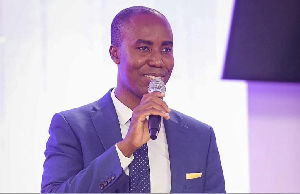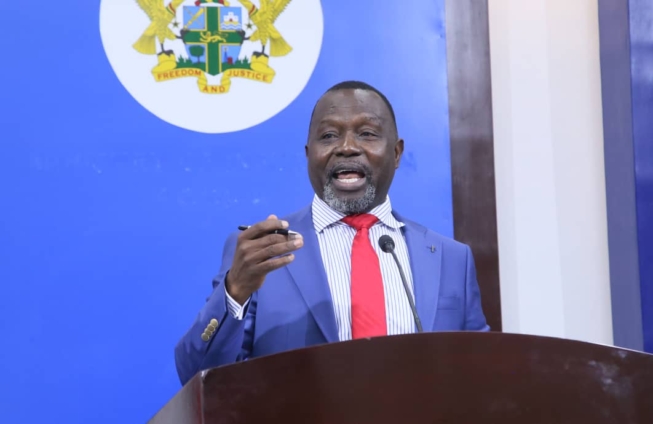The immediate past Director-General of the National Signals Bureau, Kwabena Adu-Boahene, and three other associates have been slapped with multiple charges following their alleged involvement in the misappropriation of over Gh¢49 million earmarked for Ghana’s cybersecurity infrastructure.
Filed on April 30, 2025, by the Attorney-General’s Department at the High Court (General Jurisdiction Division) in Accra, the charge sheet outlines an elaborate scheme of theft, fraud, money laundering, and abuse of public office, raising deep questions about financial accountability and procurement integrity within Ghana’s public sector.
Kwabena Adu-Boahene, former Director of the Bureau of National Communications, is the principal accused in the eleven-count charge sheet.
He is alleged to have orchestrated a fraudulent operation in 2020 under the guise of procuring a cyber defence system for the Republic of Ghana from a company known as ISC Holdings Limited.

Through this elaborate pretext, Adu-Boahene is accused of stealing a staggering Gh¢49.1 million from the state.
The charge sheet, signed by the Attorney-General and Minister for Justice, Dr. Dominic Akuritinga Ayine, alleges that Adu-Boahene misappropriated three separate tranches of funds between February and March 2020.
On February 5, 2020, he allegedly stole Gh¢27.1 million. Then, on March 20 and March 30, 2020, he again appropriated Gh¢1 million and Gh¢21 million, respectively—all under false pretences involving the purported procurement of cybersecurity systems.
The scandal is not limited to Adu-Boahene alone. The second and third accused persons, Angela Adjei Boateng and Mildred Donkor, along with a corporate entity, Advantage Solutions Limited, are all indicted in the matter.
They face a range of charges, including conspiracy to steal, collaboration in abusing public office for private gain, and money laundering.
“KWABENA ADU-BOAHENE and ANGELA ADJEI BOATENG, that you, in February and March 2020, in Accra and within the jurisdiction of this Court, did agree to act together to steal the sum of about Forty-Nine Million, One Hundred Thousand Ghana cedis (Ghe 49,100,000.00), belonging to the Republic of Ghana with the intention of depriving the Government of Ghana of the said amount”.
Attorney-General and Minister for Justice, Dr. Dominic Akuritinga Ayine
Their plan, executed over February and March 2020, allegedly relied on misrepresentations about cybersecurity procurement from ISC Holdings Limited. The state contends that these representations were entirely fictitious.
False Pretence
In Count Five, Adu-Boahene is charged with defrauding the state by false pretence, having misled the government into believing that a legitimate purchase was being made when, in fact, there was none.

He is further accused of causing financial loss to the state under Section 179A of the Criminal Offences Act—a charge that carries grave implications for public financial managers.
One of the most troubling aspects of the charge sheet is Count Seven, which accuses Adu-Boahene of using his public office for personal gain.
As Director of the Bureau of National Communications, he is alleged to have dishonestly abused his office to siphon off state funds under the cover of a national cybersecurity initiative.
Angela Adjei Boateng is further implicated in this offence under Count Eight for collaborating in this misuse of office.
The charge sheet escalates into more severe territory in Counts Ten and Eleven, where all four accused persons—including Mildred Donkor and Advantage Solutions Limited—are charged with money laundering and conspiracy to commit money laundering.
The prosecution asserts that these individuals knowingly took possession of part of the Gh¢49.1 million, fully aware that it was proceeds of crime.
These charges are grounded in Ghana’s Anti-Money Laundering Act, 2020 (Act 1044), a law designed to clamp down on the concealment of illicit funds.
Perhaps one of the more technical but no less serious accusations lies in Count Nine, where Adu-Boahene is charged under the Public Property Protection Act, 1977 (SMCD 140).
According to the state, he obtained public funds based on false statements about procuring a cyber defence system—a claim the Attorney-General’s office says he knew was false or had no reasonable basis to believe was true.
The action comes at a time when the public calls for accountability, especially against former government officials alleged to have been involved in corruption, is growing louder

The scandal not only exposes potential lapses in procurement oversight but also highlights systemic weaknesses in the monitoring of high-value public sector transactions.
The totality of the allegations suggests a coordinated and premeditated effort to defraud the state through fictitious procurement deals.
If proven in court, the case could mark one of Ghana’s most high-profile corruption convictions in recent memory, touching on critical national security infrastructure and involving millions of taxpayer funds.
Dr. Dominic Ayine’s signing of the charge sheet underscores the government’s intent to pursue justice with the full weight of the law.
READ ALSO: TotalEnergies Posts $4.2B in Q1 Earnings























